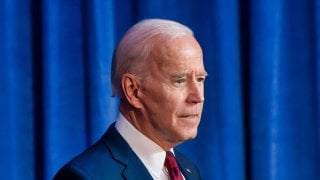Joe Biden and the Perception Paradox
Perception is king in power politics. Audiences foreign and domestic take the measure of the leadership of a powerful nation—a behemoth like the United States. How observers gauge the capability, competence, and fortitude of that nation’s leadership determines how seriously they take statements of purpose issuing from its capital. If they hold a president in slight regard, they will take his or her words lightly—and shape their actions accordingly.
Perception is king in power politics. Audiences foreign and domestic take the measure of the leadership of a powerful nation—a behemoth like the United States. How observers gauge the capability, competence, and fortitude of that nation’s leadership determines how seriously they take statements of purpose issuing from its capital. If they hold a president in slight regard, they will take his or her words lightly—and shape their actions accordingly. Aggressors will be emboldened. They will be neither deterred from aggression nor coerced into actions they resist taking. Foreign allies, partners, and friends will blanch. The superpower’s commitments to them will lose credence.
Foe and friend alike will look to their own devices to advance their interests and purposes. As they turn away the superpower’s international standing and claim to leadership will decay.
Now, human perception is fickle. Perceptions of a leader’s mental keenness may be neither accurate nor fair. They matter all the same. They sway what other governments, societies, and armed forces do. That augurs ill for American stewardship of the liberal world order, a system the nation has presided over since defeating imperial Japan in 1945.
I refer, of course, to last Thursday’s presidential debate between candidates Joe Biden and Donald Trump. In the debate’s aftermath voices from across the political continuum adjudged President Biden’s performance proof of mental infirmity. The New York Times editorial board clamored for Biden to quit the race for the good of the country. Veteran Washington Post journalist Bob Woodward pronounced the president’s showing “so bad, so awful” that it dumped a “political hydrogen bomb” on the White House.
Nor were the alarm—or jeers—confined to North America. The Wall Street Journal canvassed European political leaders and opinionmakers for their views. Nathalie Tocci, director of the Institute of International Affairs in Rome, reported that “The reading in Europe is that this has been an unmitigated disaster.” She implied this is a widespread if not universal verdict on the far side of the Atlantic. Polish prime minister Donald Tusk opined that the Democrats “definitely have a problem. The reactions have been unambiguous.” Former Slovenian prime minister Janez Janša confessed to wagering that Biden will not be on the ballot come November.
Reactions out of the Asia-Pacific took a similar tenor. Over at ChinaTalk, Lily Ottinger presented a roundup of commentary in China. Some of the takes were downright hilarious. One wiseacre in Beijing mock-saluted both candidates: “These two elderly people are 70 or 80 years old and still working hard for their jobs It’s inspiring.” Another marveled that American technology keeps the walking dead in public office: “I’m watching the recorded U.S. presidential debate, and I’m wondering, ‘When did the U.S. master the biotechnology necessary to reanimate corpses?’ It’s so scary—the USA really is the beacon of humanity. The technology is so advanced.”
If these observers are expressing a consensus view, the debate implanted doubts about President Biden’s mental fitness among decisionmakers and average citizens at home and abroad. How do such perceptions affect U.S. foreign policy and strategy? Not in a beneficial way. Think about deterrence, the effort to discourage red teams from actions national leaders deem unacceptable. The late Henry Kissinger fashioned the classic definition of deterrence, depicting it as a multiple of capability, willpower, and belief. You deter by issuing a threat and convincing an antagonist you have both the wherewithal and the resolve to follow through on the threat under circumstances you say you will. Kissinger reminds us that this is multiplication, not addition. If any variable is zero your deterrent effort fails.
You can be as musclebound and resolute as you like, but you will not deter if the antagonist perceives you as infirm.
The same logic applies to coercion and reassurance. Coercion, though, involves issuing a threat in an attempt to strongarm the red team’s leadership into doing something it prefers not to do rather than cow it into refraining from doing it wants to do. Meanwhile, reassurance involves convincing allies, partners, or friends you have the capability and the determination to keep your commitments to them. Partnerships endure when partners repose confidence in one another. The purposes and target audiences for deterrence, coercion, and reassurance differ, but in each sphere the goal is to make the target audience a believer in your physical and mental prowess.
In your strength, in other words.
I’ve come to think Kissinger’s formula warrants a slight amendment, handy tool though it is. It feels as though competence is an important enough factor in international interactions that it needs to be broken out and considered separately. After all, the finest weapon is no better than its wielder. Capability depends on the competence of those who build, equip, maintain, and operate military forces. Think about 2020, when a big-deck amphibious warship, USS Bonhomme Richard, burned to a charred hulk in its homeport, or 2017, when a spate of collisions hurt the U.S. Navy’s image as the world’s premier oceangoing fighting force. Memories of these catastrophes linger. Friends and prospective foes alike may entertain doubts about threats or promises issuing from Washington DC if carrying them out depends on U.S. naval power.
But an individual’s or institution’s reputation for competence can suffer from more than mishandling matériel. Competence also factors into the larger intellectual and emotional dimensions of deterrence, coercion, or reassurance. An incompetent head of state might yield to unwise policy counsel, broadcasting threats or promises the nation cannot keep or does not care about enough politically to keep. Idle threats discredit future professions of purpose. Or he could fail to craft believable threats or promises when circumstances demand a strong stance. An inconstant leader might suffer bewilderment or despair in the midst of a crisis, or lash out with unforeseeable consequences. (Believe me, irascibility is a thing later in life.) Influential audiences could come to doubt American reliability in world affairs.
Red teams such as China and Russia will be quick to take advantage of such perceptions. After all, the Oval Office will not change hands till next January, no matter the result of November’s election. President Biden will be in charge for months. They could run wild in the South China Sea, Taiwan Strait, or other embattled zones without fretting overmuch about U.S. efforts to thwart them. Furthermore, perceived incompetence within the U.S. foreign-policy establishment hands alliance-breakers a crowbar to pry apart U.S. alliances and partnerships. After Bonhomme Richard burned, for instance, the Chinese Communist Party-affiliated tabloid Global Times promptly ran a cartoon warning Taiwan not to depend on the U.S. armed forces for its security. The Times’ bottom line: a benefactor whose ships burn at their moorings in peacetime is an untrustworthy benefactor.
As the furor over the presidential debate suggests they have.
That’s a takeaway that’s hard to gainsay.
I hasten to add that none of this is a brief on behalf of electing Donald Trump. If age has come to be a yardstick for measuring capability, resolve, and competence—and it seems it has—well, Trump is barely younger than Joe Biden. If elected he will be well into his eighties—older than Biden is now—by the time his term expires in January 2029. Father Time is undefeated in this life. Trump’s legendary vigor will fail him at some point, perhaps while he inhabits the White House. His faculties could fade slowly, or falter suddenly. And then we will be back in the same predicament where we find ourselves now.
So strap yourselves in—we’re in for a bumpy ride between now and January 20, 2025. If not longer.
About the Author: Dr. James Holmes
Dr. James Holmes is J. C. Wylie Chair of Maritime Strategy at the Naval War College and a Nonresident Fellow at the University of Georgia School of Public and International Affairs. The views voiced here are his alone.
">


